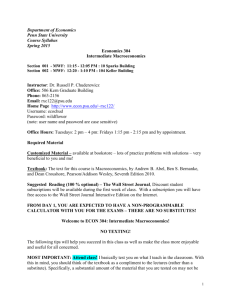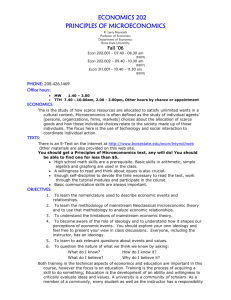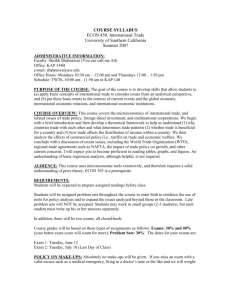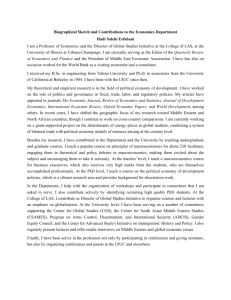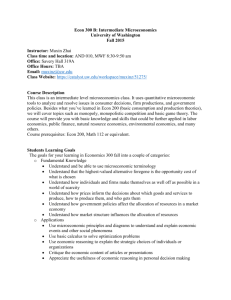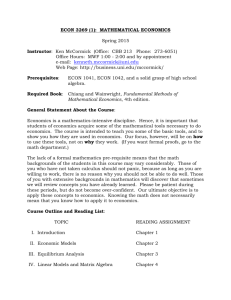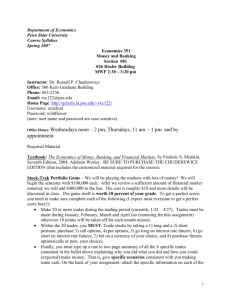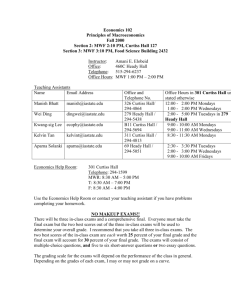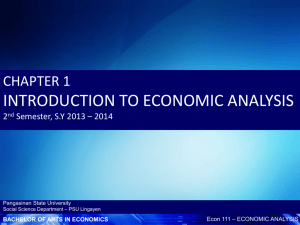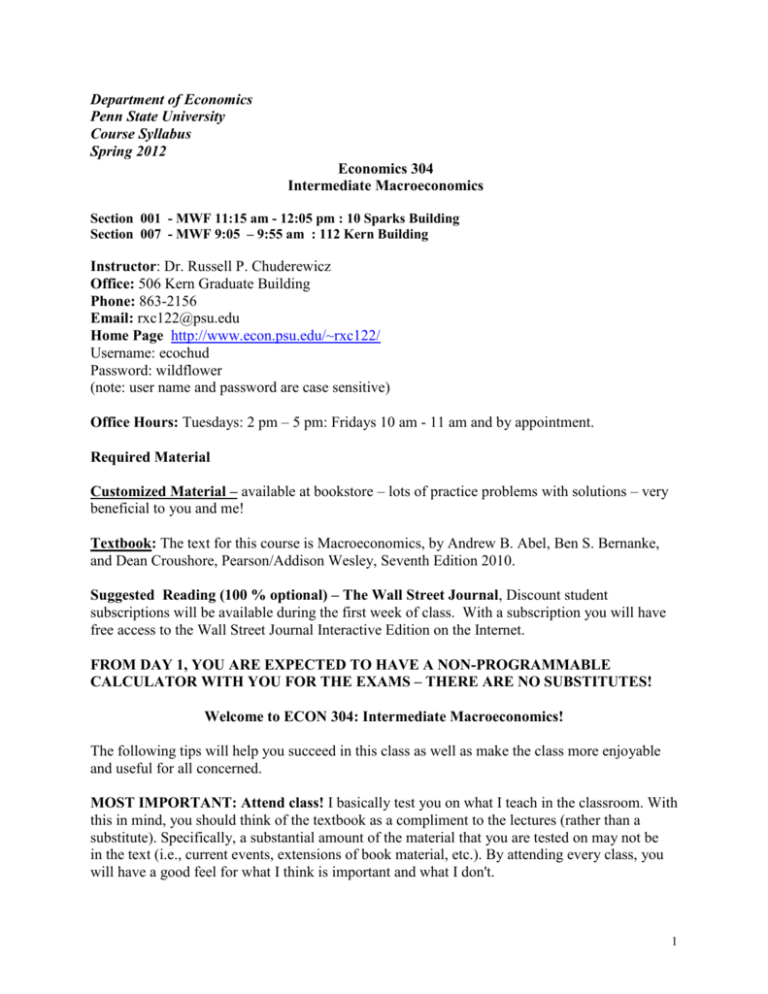
Department of Economics
Penn State University
Course Syllabus
Spring 2012
Economics 304
Intermediate Macroeconomics
Section 001 - MWF 11:15 am - 12:05 pm : 10 Sparks Building
Section 007 - MWF 9:05 – 9:55 am : 112 Kern Building
Instructor: Dr. Russell P. Chuderewicz
Office: 506 Kern Graduate Building
Phone: 863-2156
Email: rxc122@psu.edu
Home Page http://www.econ.psu.edu/~rxc122/
Username: ecochud
Password: wildflower
(note: user name and password are case sensitive)
Office Hours: Tuesdays: 2 pm – 5 pm: Fridays 10 am - 11 am and by appointment.
Required Material
Customized Material – available at bookstore – lots of practice problems with solutions – very
beneficial to you and me!
Textbook: The text for this course is Macroeconomics, by Andrew B. Abel, Ben S. Bernanke,
and Dean Croushore, Pearson/Addison Wesley, Seventh Edition 2010.
Suggested Reading (100 % optional) – The Wall Street Journal, Discount student
subscriptions will be available during the first week of class. With a subscription you will have
free access to the Wall Street Journal Interactive Edition on the Internet.
FROM DAY 1, YOU ARE EXPECTED TO HAVE A NON-PROGRAMMABLE
CALCULATOR WITH YOU FOR THE EXAMS – THERE ARE NO SUBSTITUTES!
Welcome to ECON 304: Intermediate Macroeconomics!
The following tips will help you succeed in this class as well as make the class more enjoyable
and useful for all concerned.
MOST IMPORTANT: Attend class! I basically test you on what I teach in the classroom. With
this in mind, you should think of the textbook as a compliment to the lectures (rather than a
substitute). Specifically, a substantial amount of the material that you are tested on may not be
in the text (i.e., current events, extensions of book material, etc.). By attending every class, you
will have a good feel for what I think is important and what I don't.
1
Participate in Class. Nothing is worse than an economics course without dialogue. For my part,
I will continuously ask questions during class. I encourage you to ask questions and/or share
personal economic experiences with the class. Over the years I have learned a great deal from
students such as yourself!
Frequently check the home page. I take advantage of today's technology and use it extensively
in conducting this course. I will use the home page to provide you with lecture notes, practice
tests, study notes, homework assignments, summaries, articles on current events, etc. Keep in
mind that you will be tested on everything that is on the home page.
Keep in touch throughout the semester. I basically have an open door policy and would love
to chat with you. Many students have lots of trouble with Economics in general and in particular;
this course. Remember, I am here to serve you.
RULES/REGULATIONS – Don’t leave early – if you must, let me know before class. BE
POLITE to me and your classmates – no talking during class. TURN OFF ALL CELL
PHONES BEFORE CLASS.
Academic Integrity: Dishonesty of any kind is not tolerated in this course. Dishonesty includes, but is not limited
to, cheating, plagiarizing, fabricating information or citations, facilitating acts of academic dishonesty by others,
having unauthorized possession of examinations, submitting work of another person or work previously used
without informing the instructor, or tampering with academic work of other students. Students who are found
dishonest will receive the most severe academic sanction consistent with PSU polices. A minimum penalty for any
breach of academic integrity is the grade of “F” for the course. For more on academic integrity, click on or type in
the following URL address:
http://econ.la.psu.edu/Undergraduate_Program/undergrad_page.htm#aca_int
Disability Access Policy: The Pennsylvania State University encourages qualified persons with disabilities to
participate in its programs and activities and is committed to the policy that all people shall have equal access to
programs, facilities, and admissions without regard to personal characteristics not related to ability, performance, or
qualifications as determined by University policy or by state or federal authorities. If you anticipate needing any
type of accommodation in this course or have questions about physical access, please tell the instructor as soon as
possible.
You are required to take all the exams. If one of the midterm exams is missed due to a University Approved
Excuse, the typical policy is for a make-up exam to be administered at another, agreed upon time. In ‘special’
cases, weight for that exam will be shifted to the subsequent exam. If you do not have a valid excuse, you will
receive a zero for that exam. No exceptions will be made. Job interviews and travel plans (except as required by
university-sponsored activities) DO NOT constitute valid excuses for missing an exam. Students should plan to be in
town until they take the final exam. For more information on valid excuses, please see the Department of Economics
policy on valid excuses, which is available at the department web site at:
http://www.econ.psu.edu/Undergraduate_Program/undergrad_page.htm#valid
If you have a documented medical emergency and hence are unable to take an exam or a quiz please e-mail me in
advance, if possible.
Please see me if you have concerns or comments about the course. In special circumstances, you may contact the
Director of Undergraduate Studies in Economics or provide feedback via a comment box that the Department
maintains in 303 Kern.
2
Tentative Course Outline (Subject to Change)
Introduction
Chapter 1
Measures of Macroeconomic Variables
Chapter 2
The Labor Market and Productivity
Chapter 3
Equilibrium in the Goods Market
Chapter 4
The Goods Market in an Open Economy
Chapter 5
Asset Markets
Chapter 7, 14
Exam 1: Wednesday Night: February 22 8:15 pm – 10:15 pm Room TBA
Business Cycles
Chapter 8
The IS-LM/AD-AS Framework
Chapter 9
Classical Economics
Chapter 10
Keynesian Economics
Chapter 11
Exam 2: Wednesday Night: March 28 8:15 pm – 10:15 pm Room TBA
The Fed’s FRB Model of the Economy
article provided
Unemployment and Inflation Policy
Chapter 12
Exchange Rates
Chapter 13
Final Exam (Comprehensive) The final exam will be administered during finals week according to the
University schedule.
Grading Policy: I basically follow a traditional grading scale (see below). “Plusses” and
“minuses” will be determined according to the distribution of the grades at the end of the
semester. There are three exams: The first and second worth 25% of your grade and the final
exam (comprehensive) is also worth 25% of your grade. The remaining 25% of your grade is
accounted for by homework assignments throughout the semester. . Note that late homework
assignments will not be accepted. There are no exceptions! Also, you must hand in homework
in the section you are registered in – otherwise, you will earn a zero. Good luck to all!
Grading Scale: 90% + = A or A - ; 80 - 89% = B-, B or B+; 70 - 79% = C or C+; 60 - 69% = D
3

